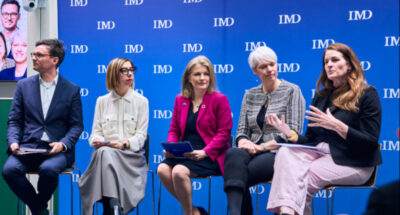
How to manage power dynamics in high-stakes negotiations
Former FBI agent Joe Navarro explains how to leverage non-verbal cues, manage power dynamics, and build trust to overcome deadlocks in negotiations....

by Benoit F. Leleux Published April 16, 2025 in Competitiveness • 9 min read
While tech startups and Silicon Valley often dominate entrepreneurship narratives, management buyouts and corporate carve-outs represent an equally entrepreneurial path that deserves attention. These are the topics explored at the relaunch of IMD’s Alumni Community for Entrepreneurship (ACE).
To demonstrate this alternative entrepreneurial journey, the event highlighted the remarkable transformation of dss+, an operational safety and risk management consulting firm carved out from DuPont in 2019. The company, which recently celebrated its fifth anniversary, has grown from 620 to 1,750 employees and was named the best-managed Swiss company by Deloitte in 2024.
The event explored how traditional views of entrepreneurship can be expanded beyond startups. When discussing entrepreneurship, people often think of startups, technology, and Silicon Valley. While these certainly form a part of the entrepreneurial spectrum, the concept is much broader. As the dss+ story demonstrates, buyouts, turnarounds, and corporate venturing can be incredibly entrepreneurial exercises.
I found the highest concentration of knowledge in the world about operations. The density of knowledge in this company was unmatched in the world in terms of operations management.Davide Vassallo, CEO dss+
The story of dss+ begins nearly 60 years ago within US chemical giant DuPont. In 1968, the American company started offering its operational expertise to suppliers and clients, helping them make complex operations safer, more productive, and environmentally friendly. This knowledge-sharing initiative evolved over decades into a sophisticated business unit with global reach and deep operational expertise.
Davide Vassallo, now CEO of dss+, joined DuPont in 2010, bringing management consulting experience and environmental engineering skills. He quickly discovered the unit’s untapped potential through extensive travel across five continents, meeting clients and colleagues to understand the business’s capabilities.
“I found the highest concentration of knowledge in the world about operations,” Vassallo recalled. “The density of knowledge in this company was unmatched in the world in terms of operations management. Second, I found people truly driven by a purpose. They don’t go to work for money, glory, a title, or a career. They go to work because they want to help others to be safer, more productive, and more sustainable.”
Vassallo proposed carving out the business in 2011, but DuPont wasn’t ready. The opportunity emerged in 2015-16 during the DuPont merger with Dow, when the sustainability consulting unit was designated ‘non-core’ – not fitting neatly into the new corporate structure. While being labeled ‘non-core’ might have been disheartening for some, Vassallo and his team saw it as the chance they had been waiting for. DuPont’s leadership sought to find the best owner for this business unit, initiating a two-year process of exploring potential buyers.

What followed was an entrepreneurial process quite different from the typical startup path. Vassallo emphasized that their entrepreneurial journey began not in a garage with a breakthrough invention, but in the corporate offices of DuPont and an investment firm in Geneva. He stressed that entrepreneurship doesn’t require starting young or from scratch – it can happen at any career stage with the right opportunity and team support.
As DuPont explored selling the business unit, Vassallo approached the CEO with a bold proposal: “The best buyer for this business is the people running the business – myself and my colleagues.”
Enter Guy Semmens, managing partner at Gyrus Capital, who had previously led a chemical business buyout. After initial meetings with Vassallo, Semmens saw potential despite some significant challenges, such as the fact that the business operated in 40 countries but had no independent financial structure or audited numbers.
“We worried like hell about that,” Semmens admitted, referring to the transition away from the globally recognized DuPont name, “But the feedback from customers was really simple: it’s the people. If you have the people, you get the business – it has nothing to do with the brand.”
A groundbreaking aspect of the transaction was how equity was distributed. Rather than restricting ownership to a small circle of senior executives, the dss+ buyout was structured to offer equity participation to 60-70 managers – approximately 10-15% of the employees. This approach represented a significant departure from traditional private equity models, particularly for service businesses.
“It has changed now, but 10 years ago, people were very afraid of people, businesses and consultants,” Semmens observed. The conventional wisdom held that service businesses were risky investments because the assets have legs, and they can walk out the room.”
dss+ has a strong sense of purpose, “Saving lives and creating a sustainable future,” and a potent pitch line: “Protect. Transform. Sustain.” A global team of 1,750 specialists offers operations management consulting across seven core industries, working with more than 950 clients on 1,800 projects across 41 countries, driving strong organic growth.
By having employees invest their own money and by creating incentives for outperformance, they built a powerful structure for motivation, incentivization, and talent retention.
According to Vassallo, the true entrepreneurial aspect was creating a genuine partnership rather than simply following investor guidance. Management’s substantial financial investment alongside the investors established a sustainable foundation, with managers having skin in the game from day one.
The initial transaction closed in September 2019, with investments from Gyrus Capital, the management team, and a vendor loan from DuPont. The challenges became apparent immediately.

Six months after launch, COVID-19 hit – devastating for a business model built on consultants working on-site with clients. The leadership faced a crucial decision: reduce staff to cut costs or maintain the team through the uncertainty.
Vassallo recalled that it took just five minutes to decide to retain everyone, recognizing they had acquired “the best of the best” from DuPont and couldn’t afford to lose this talent despite the pandemic.
This crisis tested the partnership between management and investors. “The closer you are to the business, the more you understand the business and the people, the more confidence you build in that senior leadership team, the better the decision you’re going to take,” Semmens reflected.
The team used the pandemic to digitalize their business, codify intellectual property, and strengthen client relationships. They established daily check-ins to monitor the evolving situation and pivoted to remote service delivery. When travel resumed in 2021, dss+ could respond faster than competitors who had reduced staff during the emergency, and business boomed. What initially appeared to be a disaster became what Vassallo described as “a blessing,” giving the newly independent company time to strengthen its foundation.
The equity event crystallized their investments, showing the tangible rewards of entrepreneurship through acquisition.
By 2023, the company was growing rapidly under its new brand (renamed dss+ in 2022). Management executed a secondary transaction, bringing in UK-based Inflexion as a new investor. Gyrus Capital sold down its stake but retained a minority position.
This transaction accomplished two strategic objectives. First, it reset the equity table, allowing more employees to become owners, and addressing a developing divide between founding investors and newer team members. Second, it demonstrated the real value of employees’ equity investments.
“We invested our life savings, discussing with spouses and family and saying, ‘Now we have to pay to go to work,'” joked Vassallo. “We asked 600 corporate people to turn into entrepreneurs, putting their own money on the table, their life savings. This is a stressful situation if you’re not a natural investor or entrepreneur.”
The equity event crystallized their investments, showing the tangible rewards of entrepreneurship through acquisition. Remarkably, 90% of the original investing team reinvested in the second round, demonstrating their commitment to building a legacy beyond that first liquidity event.

Growth at dss+ has been remarkable, Vassallo noted. From 620 people at carve-out, dss+ expanded to 1,750 full-time employees and 300 specialized part-time experts in just five years. The company achieved annual double-digit growth in 2021, 2022, and 2023 – an impressive feat for a people-based business that requires extensive onboarding and training to maintain service quality.
The company diversified its capabilities beyond safety and risk management, expanded geographically, and adjusted its pricing strategy to better capture the value it creates. This diversification strategy was carefully targeted. “We made tough choices about which industries we can win in, when we have the right to win, and where we want to win,” Vassallo explained.
Equally important was optimizing revenue by implementing value-based pricing: “We have a great reputation, but we undersell ourselves. So, we adjusted all our pricing strategy globally to price for value.”
“We aspire to leave this company in great hands to continue this story,” said Vassallo, “So, in 10 years, you can invite the next CEO and the next investors here to IMD to continue the story.”
The bigger the goal, the more important it is to have the right team supporting the vision.
When asked about regrets, Vassallo first noted that perhaps he should have bought 100% of the company himself, however, he quickly pivoted to emphasize that success requires the right partners. The bigger the goal, the more important it is to have the right team supporting the vision. “If it’s only yours, it’s a small goal, because we are not all Steve Jobs. We are normal people. So, the bigger the goal, the bigger the team and the capability has to be.”
This broader view of entrepreneurship – one that encompasses buyouts, carve-outs, and cooperative ownership models – offers a compelling alternative to traditional startup narratives and demonstrates how corporate expertise can be unleashed through entrepreneurial structures.
As businesses increasingly focus on purpose and impact alongside financial returns, the dss+ story provides a roadmap for transforming existing corporate assets into vibrant, independent ventures with entrepreneurial energy and shared ownership.

Chief Executive Officer, dss+
Davide Vassallo is the CEO of dss+. An environmental engineer by background, Vassallo joined DuPont in 2010 after previously serving as head of the sustainability practice of a strategic consultancy. At DuPont, Vassallo rose to become Vice President & Global Managing Director with the firm’s consulting arm, DuPont Sustainable Solutions, before taking over the leadership of dss+ in 2019.

Benoît Leleux is the Stephan Schmidheiny Professor of Entrepreneurship and Finance at IMD. He is Co-Director of the Foundations for business leaders program and Program Director of the Winning sustainability strategies program.

May 6, 2025 • by Anna Cajot in Competitiveness
Former FBI agent Joe Navarro explains how to leverage non-verbal cues, manage power dynamics, and build trust to overcome deadlocks in negotiations....

April 24, 2025 • by Jerry Davis in Competitiveness
Many regional developers have tried and failed to emulate Silicon Valley’s VC-driven model for innovation. Detroit, the birthplace of Ford, is following an alternative route – with promising results....
 Audio available
Audio available
April 11, 2025 • by Jim Pulcrano, Jung Eung Park, Christian Rangen in Competitiveness
Founders searching for funding must be targeted in their approach to securing a lead investor. A global survey of VCs offers valuable insights into what makes them tick....

March 7, 2025 • by Heather Cairns-Lee, Alexander Fleischmann in Competitiveness
As businesses face growing polarization on DE&I, companies must embed inclusion into their core strategy, empower leaders to drive change, and ensure that the progress made so far is not quietly undone....
Explore first person business intelligence from top minds curated for a global executive audience